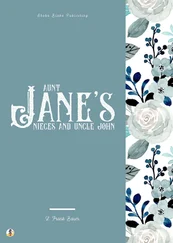Ouida - A House-Party, Don Gesualdo, and A Rainy June
Здесь есть возможность читать онлайн «Ouida - A House-Party, Don Gesualdo, and A Rainy June» — ознакомительный отрывок электронной книги совершенно бесплатно, а после прочтения отрывка купить полную версию. В некоторых случаях можно слушать аудио, скачать через торрент в формате fb2 и присутствует краткое содержание. Жанр: foreign_prose, literature_19, foreign_antique, на английском языке. Описание произведения, (предисловие) а так же отзывы посетителей доступны на портале библиотеки ЛибКат.
- Название:A House-Party, Don Gesualdo, and A Rainy June
- Автор:
- Жанр:
- Год:неизвестен
- ISBN:нет данных
- Рейтинг книги:4 / 5. Голосов: 1
-
Избранное:Добавить в избранное
- Отзывы:
-
Ваша оценка:
- 80
- 1
- 2
- 3
- 4
- 5
A House-Party, Don Gesualdo, and A Rainy June: краткое содержание, описание и аннотация
Предлагаем к чтению аннотацию, описание, краткое содержание или предисловие (зависит от того, что написал сам автор книги «A House-Party, Don Gesualdo, and A Rainy June»). Если вы не нашли необходимую информацию о книге — напишите в комментариях, мы постараемся отыскать её.
A House-Party, Don Gesualdo, and A Rainy June — читать онлайн ознакомительный отрывок
Ниже представлен текст книги, разбитый по страницам. Система сохранения места последней прочитанной страницы, позволяет с удобством читать онлайн бесплатно книгу «A House-Party, Don Gesualdo, and A Rainy June», без необходимости каждый раз заново искать на чём Вы остановились. Поставьте закладку, и сможете в любой момент перейти на страницу, на которой закончили чтение.
Интервал:
Закладка:
"You think everybody would be exiled inside his own ring-fence!"
" Her own ring-fence,—well, nearly everybody. There would certainly be no garden-parties at Marlborough House."
Mrs. Wentworth Curzon is not pleased; she is a star of the first magnitude at Marlborough House.
"Why does she take this absent woman's character away?" thinks Brandolin, with a sense of irritation. "I will trust the Babe's instincts sooner than hers."
He does not know Xenia Sabaroff; but he admires the photograph of her which stands on the boudoir table, and he likes the tone of the letter written from Aix. With that spirit of contradiction which is inborn in human nature, he is inclined to disbelieve all that Nina Curzon has told him. Lustoff and Sabaroff probably both deserved their fates, and the departure from the court of St. Petersburg might very possibly have been voluntary. He has a vague feeling of tenderness for the original of the photograph. It often happens to him to fall sentimentally and ephemerally in love with some unknown woman whose portrait he has seen or of whose charms he has heard. Sometimes he has avoided knowing these in their actual life, lest he should disturb his ideals. He is an imaginative man with a great amount of leisure in which to indulge his fancies, and his knowledge of the world has not hardened his feelings or dulled his fancy. There is something of the Montrose, of the Lord Surrey, in him.
"To think of all one knows about that hussy," he muses, as he smokes a cigar in his bedroom before dressing for dinner. By the uncomplimentary epithet he means Mrs. Wentworth Curzon. "Such a good fellow as Fred Curzon is, too, a man who might have been made anything of if she'd only treated him decently. When he married her he adored the ground she walked on, but before a week was out she began to fret him, and jar at him, and break him in, as she called it; he was too poor for her, and too slow for her, and too good for her, and she was vilely cruel to him,—it's only women who can be cruel like that, she's had more lovers than anybody living, and she's taken every one of 'em for money; nothing but money. Old Melton gave her the Park-Lane House, and Glamorgan gave her her emeralds, and Dartmoor paid her Paris bills for ten years, and Riverston takes all her stable-expenses. Everything she does is done for money; and if she puts any heart at all now into this thing with Lawrence, it is only because she's getting older and so getting jealous,—they always do as they get on,—and then she calls Russians dissolute and depraved, good Lord!"
With which he casts aside his cigar, and resigns himself to his servant's hands as the second gong sounds.
CHAPTER VI
The very bachelor rooms at Surrenden are conducive to revery and indolence, cosily comfortable and full of little attentions for the guest's bien-être , among which there is a printed paper which is always laid on the dressing-table in every room at this house: it contains the latest telegrams of public news, which come every afternoon from a London news-agency.
"I dare say to the political fellows they are delightful," reflects Brandolin, as he glances down the lines, "but to me they unpleasantly recall an uncomfortable world. I don't dine the worse, certainly, for knowing that there is a revolution in Patagonia or an earthquake in Bolivia, but neither do I dine the better for being told that the French government is destituant all moderate prefets in favor of immoderate ones. It is very interesting, no doubt, but it doesn't interest me, and I think the possession of these fresh scraps of prosaic news spoils dinner-conversation."
Brandolin does not consider it conversation to say, "Have you seen so-and-so?" or, "What a sad thing such-and-such is, isn't it!" He likes persiflage, he likes banter, he likes argument, he likes antithesis, he likes brilliancy, and the dinner-tables of the epoch seldom offer these good things with their Metternich hock and Mouton Rothschild. He is fond of talking himself, and he can be also a very good listener. If you cannot give the quid quo pro in hearing as in speaking, you may be immensely clever, but you will be immediately pronounced a bore, like Macaulay and Madame de Staël. Brandolin likes talking not for the sake of showing himself off, but for the sake of being amused, of eliciting the opinions and observing the minds of others, and he is convinced that if the conversational art were cultured as it used to be in Bourbon Paris, life would become more refined, more agreeable, more sympathetic, and less given over to gross pleasures of the appetites.
"Children should be taught to talk," he observes one day to Lady Usk, "and they should not be allowed to be slovenly in their speech any more than in their dress. You would not let them enter your presence with unbrushed hair, but you do let them use any bald, slangy, or inappropriate words which come uppermost to them. There is so much in the choice of words! A beautiful voice is a delicious thing, but it avails little without the usage of apt and graceful phrases. Did you ever hear Mrs. Norton sustain a discussion or relate an anecdote? It was like listening to perfect phrasing in music. When she died, the art of conversation died with her."
"We are always in such a hurry," says Lady Usk, which is her habitual explanation of anything in which her generation is at fault. "And hurry is always vulgar, you know, as you said the other day: it cannot help itself."
"You are a purist, my dear Brandolin," says Lady Dolgelly, who hates him.
"'Purity, daughter of sweet virtues mild!'" murmurs Brandolin. "Alas, my dear ladies, I cannot hope that she dwells with me in any form! When she has a home in your own gentle breasts, who can hope that she would ever take shelter in a man's?"
"How impertinent and how nasty he is!" thinks the lady; and she detests him a little more cordially than before. There is not a very good feeling towards him among any of the ladies at Surrenden: he does not make love to them, he does not endeavor to alter existing arrangements in his favor; it is generally felt that he would not care to do so. What can you expect from a man who sits half his days in a library?
The Surrenden library is well stored, an elegant and lettered lord of the eighteenth century having been a bibliophile. It is a charming room, panelled with inlaid woods, and with a ceiling painted after Tiepolo; the bookcases are built into the wall, so that the books look chez eux , and are not mere lodgers or visitors; oriel windows look out on to a portion of the garden laid out by Beaumont. One window has been cut down to the ground, an anachronism and innovation indeed, somewhat impairing the uniformity of the room. The present Lady Usk had it done, but one forgives her the sacrilege when one feels how pleasant it is to walk out from the mellow shadows of the library on to the smooth-shaven grass and gather a rose with one hand whilst holding an eighteenth-century author with the other.
It is in the smaller library adjacent, filled with modern volumes, that five-o'clock tea is always to be had, with all the abundant demoralizing abominations of caviare, kümmel, etc. It is a gay room, with dessus-des-portes after Watteau and every variety of couch and of lounging-chair. "Reading made easy" somebody calls it. But there is little reading done either in it or in the big library: Brandolin when he goes there finds himself usually alone, and can commune as he chooses with Latin philosophy and Gaulois wit.
"You used to read, George?" he says to his host, in expostulation.
"Yes, I used,—ages ago," says Usk, with a yawn.
Brandolin looks at him with curiosity.
"I can understand a man who has never read," he replies, "but I cannot understand a man losing the taste for reading if he has ever had it. One can dwell contented in B[oe]otia if one has never been out of it, but to go back to B[oe]otia after living in Attica–"
Читать дальшеИнтервал:
Закладка:
Похожие книги на «A House-Party, Don Gesualdo, and A Rainy June»
Представляем Вашему вниманию похожие книги на «A House-Party, Don Gesualdo, and A Rainy June» списком для выбора. Мы отобрали схожую по названию и смыслу литературу в надежде предоставить читателям больше вариантов отыскать новые, интересные, ещё непрочитанные произведения.
Обсуждение, отзывы о книге «A House-Party, Don Gesualdo, and A Rainy June» и просто собственные мнения читателей. Оставьте ваши комментарии, напишите, что Вы думаете о произведении, его смысле или главных героях. Укажите что конкретно понравилось, а что нет, и почему Вы так считаете.












